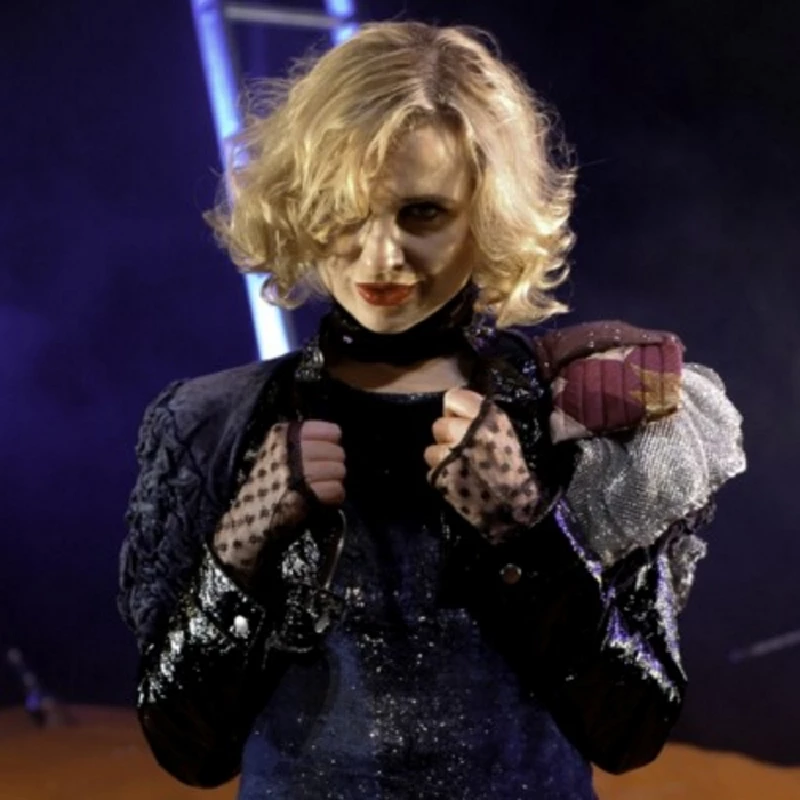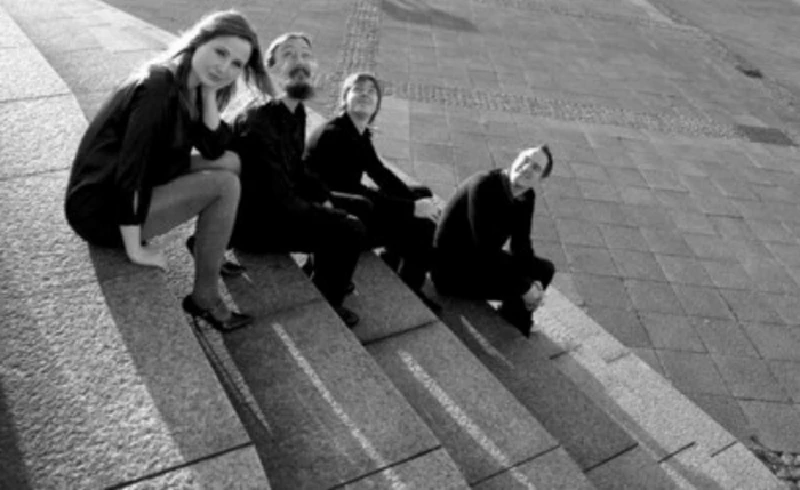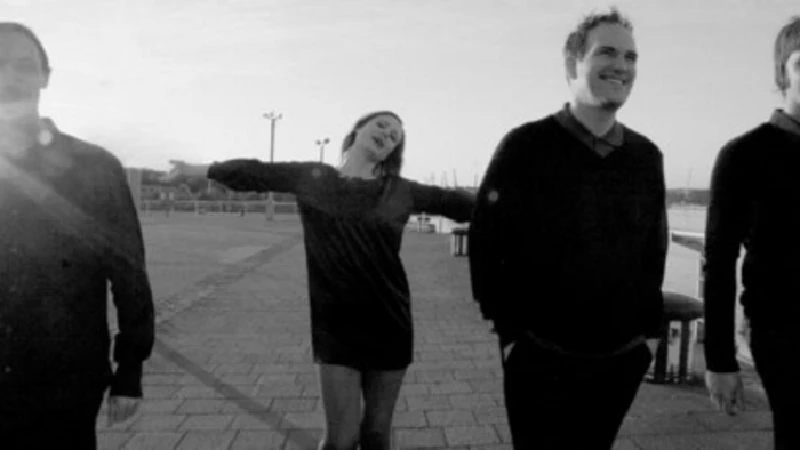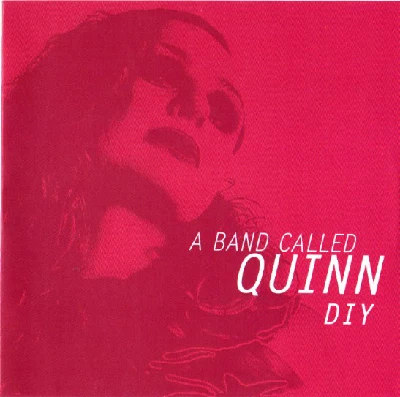A Band Called Quinn - Interview
by John Clarkson
published: 5 / 11 / 2010

intro
Louise Quinn from Glasgow electronic group A Band Called Quinn speaks to John Clarkson about appearing in Edinburgh in a controversial modern version of the 1728 play 'The Beggar's Opera' and their new album, which features the songs that they wrote for it
‘The Beggar’s Opera’ is a musical play and satire by the English dramatist, John Gay, which was first performed in 1728. It tells of MacHeath, a famous thief and womaniser, who at the start of the play has secretly married Polly, the daughter of the Peachams, a pair of thief-catchers and fences. When the Peachams find out about the marriage, upset that they will no longer be able to involve Polly in their family business, they vow, despite their new son-in-law being their best customer, to have him killed or arrested. Although Polly, one of the few characters with any virtues in the play, temporarily hides him, MacHeath is shortly afterwards taken captive by the Peachams in one of the taverns he frequents. He is sent to Newgate Prison, where he manages to persuade Lucy Lockit, the gaoler’s daughter and an old flame, to help him to escape by lying to her about his marital status. When Lucy finds out the truth about MacHeath’s marriage, she jealously tries to poison Polly. The two, however, end up friends, but are unable to stop MacHeath from being recaptured. In a final scene four pregnant women all turn up, each claiming that MacHeath is the father of their unborn child. MacHeath claims as a result that he is ready to be hanged. He is, however, spared and ‘The Beggar’s Opera’ ends in a dance to celebrate his and Polly’s marriage. Since its original 1728 production, ‘The Beggar’s Opera’ has seen many hundreds of adaptations. Perhaps most famously it was reworked in 1928 on its 200th anniversary by Bertolt Brecht and Kurt Weill as ‘The Threepenny Opera’. 1983 saw it turned into a BBC film with Roger Daltrey in the role of MacHeath. It also provides the main plot backdrop for Alan Ayckbourn’s ‘A Chorus of Disapproval’, that play telling of an amateur theatre company who are working on their own production of ‘The Beggar’s Opera’. From its outset ‘The Beggar’s Opera’ has attracted controversy. Its first production, while popular with theatre-goers in London, caused outrage amongst both critics and politicians, who were furious at its focus on the under classes and its heavy political satire. Few productions of ‘The Beggar’s Opera’ have, however, since divided audiences as much as a modern version by the theatre company Vanishing Point that was performed at the Lyceum Theatre in Edinburgh last year. Set in the near future after a tsunami, its main set was the underworld of a sandpit from which MacHeath and his gang would go up a ladder to an over world above where they would carry out their robberies and crimes. Rewritten as a rock opera, it featured the Glaswegian electro pop A Band Called Quinn who appeared on stage alongside the actors throughout and also provided the production with its score. The show ran to 46 performances, moving on from the Lyceum to also being performed in Glasgow and Coventry. It also completely split reviewers and theatre goers. While it won many fans and the endorsement of the best selling crime writer and Edinburgh-based Rebus creator Ian Rankin who described the production as “phenomenal”, others were more scathing in their attitude towards it. Several theatre-goers, including established Lyceum members, walked out during it and reviews ranged from one to five stars. A Band Called Quinn’s current line-up features Louise Quinn (vocals), Bal Cooke (drums and percussion), Robert Henderson (trumpet and keyboards), Aly MacRae (guitar) and Steven Westwater (bass). It was formed out of the remnants of another band, Quinn, which in an early line-up included Alex Kapranos from Franz Ferdinand on guitar, and which released two albums, ’Inbetween Worlds’ (2001) and ‘Luss’ (2006). Since re-establishing itself as A Band Called Quinn, the group, which includes Madonna, Parisian hip hop star Kid Loco and indie legends the Pastels amongst its fans, has released another album, ‘Sun Moon Stars’, initially self-released, also came out on the Glaswegian label, Neon Tetra. The group’s second album, ‘The Beggar’s Opera’, which is a record of the songs written specially for the Vanishing Point production, was released in October on the group's own Tromolo Records. Pennyblackmusic spoke to Louise Quinn about ‘The Beggar’s Opera’, and the group’s already digitally released third album, ‘Red Light Means Go’. PB: A Band Called Quinn first became involved in Vanishing Point’s production of ‘The Beggar’s Opera’ after being talent spotted in a club night which apparently featured “jazz playing puppets, psychics and puppeteers.” Was that your own club night? LQ: Yes, it was called Club Tromolo and we did it for quite a few years at the Buff Club in Glasgow. We also toured around the Highlands and Islands with it a couple of years ago as well. PB: How did it work? Were all these characters self-created and performed? LQ: Yes, Bal and I both work as a day job for a sort of surrealist/interventionist street theatre company called Mischief La Bas, so it is kind of hard wired into our brains now to come up with surreal nonsense and characters. We wanted to play gigs, but not straightforward gigs and to bring that theatricality into the stuff that we did with the band and create this sort of environment to present the music and to make it a bit more interesting. PB: Was it a fairly natural step from doing that then to appearing at the Lyceum in Edinburgh? LQ: Well, it was and it wasn’t. Our bass player Steve doesn’t work for the theatre company and had never been to see a play before. A lot of our friends who are serious actors were quite upset about it (Laughs). Someone like Steve who had never been to see a play before in his life was suddenly starring at the Lyceum while they were all fighting for acting jobs. I actually did study drama at the Royal Scottish Academy of Music and Drama in Glasgow, but as I went into my third year the band that I was in at the time signed to Sony and I left. PB: Who were they? LQ: Hardbody. Bal was in it as well. It was a while ago now, back in the late 90s. We were signed after just ten gigs and it was the usual kind of major label rubbish. We were amongst the 99% fail rate of acts which get signed whereas the 1% has the Top 40 hit, but it was a great experience nonetheless. We got to go to New Orleans for a month to do some recording. The bill at the end and the amount of money that was spent on an album that ended up never being released was ridiculous. If we had had that now, you do think, “What would we do with it?” In saying that, however, it did set us on a path of making music. It was by no means all bad. PB: Were you aware of ‘The Beggar’s Opera’ before you were asked to become involved in the Vanishing Point production? LQ: Sort of. I wasn’t totally. I suppose my knowledge was a bit fuzzy like most people. I knew ‘Mack the Knife’ from the Bertolt Brecht version of it, had those kind of references. Matt Lenton, the director, took a big gamble in using the band. The whole point of the show was it was the Lyceum’s attempt to wake up a lot of their audience. Their subscribers were literally dying off. A lot of them were in their 90s. They asked Vanishing Point to do the show with the express purpose of drawing in a younger audience and creating a bit of controversy. PB: It totally divided theatre-goers. There was a massive reaction to it. People either loved it or hated it and nobody seems to be apathetic about it which is an achievement in itself. Did you expect it to have such a strong reaction? LQ: No, we didn’t know what to expect. As soon as I heard about the project and I met Matt and he told me his ideas for it, it really fired me up to write a whole load of songs. There was no guarantee that those songs were actually going to make the production because it was all devised in the rehearsal room. It just so happened that those songs actually fitted what was happening and then it evolved into this thing which was halfway between a gig and a play. PB: What was your role in it? Did you play Polly? LQ: No, I was just an unnamed character and the singer, but Elspeth Brodie who played Lucy Lockitt was saying that she had decided to interpret my character as being one of MacHeath’s exes. She has been there and done the whole MacHeath thing and she is able to give this advice to Polly and Lucy in the script. The band was on stage the whole time. At times we were almost like an extension of MacHeath and the other characters. PB: Were you like a Greek chorus? LQ: Yeah, I would put it like that. We were the chorus. We did at times interact with the characters and at others reflected what those characters were. I didn’t think that I would be singing all the songs. When I was writing them, I thought the characters would be singing them. It was me, however, that ended up singing all the songs just about (Laughs). There was incidental music devised in the rehearsal room as well. PB: Did you write that as well or did that come from someone else? LQ: That was all done by the band, that and Aly MacRae who was the musical director. We have known Aly for years and now in fact he plays guitar with the band. That is how much of an effect doing the show has had on what we have become (Laughs). It has really changed things. PB: The Vanishing Point production is set directly after a tsunami. MacHeath also has a sex addiction and it has been up-dated to be made more contemporary in other ways as well. A lot of John Gay’s original themes such as legal and political corruption, poverty, injustice and loving somebody that you shouldn’t, however, all seem to be fairly timeless. Would you agree? LO: Yeah, definitely. There were so many times when we were devising the show that I just thought that it was so relevant to what was going on now. When we were devising it, the whole thing with the bankers was kicking off. Also at the time there was a diamond thief doing a lot of robberies and you found yourself cheering him on every time that you heard about him on the news. He really reminded me of MacHeath. PB: The sleeve notes for the album were written by Ian Rankin. How did you persuade him to become involved? LO: It was really strange. People started saying that Ian Rankin had been talking about us. They had been at writers’ workshops with him and they had asked him what he was listening to right now and he was saying that he was really into ‘Sun Moon Stars’. The next thing was that he went on Twitter to say that he had come to see the show in Edinburgh and that he really loved it. I started talking to him there and then we met up with him and we were just chatting and I just asked if he might be up for writing some sleeve notes because he had liked the show so much. He said that he was totally up for doing it and so he did (Laughs). PB: You were also supposed to be releasing a new album, ‘Red Light Means Go’, at about the same time as ‘The Beggar’s Opera’. It has been put back. When will that come out? LO: We are still doing a special digital release of the album to coincide with the new BBC3 drama series, ‘Lip Service’. Two of our songs appear in ‘Lip Service’. One of the tracks, ‘Can You Swim?’ appears in the opening montage. It is featured quite prominently. The series stars a girl who I went to school with, Laura Fraser. She is having a lesbian sex scene while it is playing (Laughs). Kid Loco had done a remix of ‘Oh Jackie’, the other track on ‘Lip Service’. He has turned it into a duet between me and him. I was over in Paris earlier this year singing on his next album. He got me to do a version with him of Serge Gainsbourg’s ‘Comic Strip’. Kid Loco is like a modern day Serge Gainsbourg, both in his manners and he also looks a bit like him. I got to do the Brigitte Bardot part( Laughs). He has reworked ‘Comic Strip’ as a hip hop/rap version and remixed ‘Oh Jackie’ to return the favour. We have decided to put the whole album up rather than just those two tracks. A compilation album of tracks from ‘Lip Service’ is already up there and has done well, so we thought that we would put it up digitally and then give it a proper send off and do a CD version next year. We will also be releasing ‘Oh Jackie’ as a single, but the CD version with Kid Loco. PB: Will the CD version come out on Neon Tetra or Tromolo Records? LO: That depends upon how Neon Tetra is funded. They have been absolutely fantastic, but it is a difficult period for small labels. It was brilliant of them to put out ‘Sun Moon Stars’ and they did such a great job of the cover and they funded ‘The Glimmer Song’ video too. PB: What are your other plans for the future? Will you be touring as well? LO: We just need to see what happens and who gets involved financially. The Scottish Arts Council did help us to tour before and may do again. There might be another version of ‘The Beggar’s Opera’, a sort of scaled-down version. A lot of places like Eden Court in Inverness have expressed an interest in putting a gig of ‘The Beggar’s Opera’ on. We just really need to see. We will definitely do at least a Scottish tour and maybe a couple of dates down south next year and hopefully play a few festivals as well. PB: Thank you.
Picture Gallery:-


reviews |
|
DIY (2010) |

|
| Catchy and also enormously entertaining download only re-release of single from Glaswegian electronic/dance group, A Band Called Quinn |
most viewed articles
current edition
John McKay - InterviewRobert Forster - Interview
Cathode Ray - Interview
Spear Of Destiny - Interview
Fiona Hutchings - Interview
When Rivers Meet - Waterfront, Norwich, 29/5/2025
Carl Ewens - David Bowie 1964 to 1982 On Track: Every Album, Every Song
Chris Wade - Interview
Brian Wilson - Ten Songs That Made Me Love...
Shrag - Huw Stephens Session 08.12.10 and Marc Riley Session 21.03.12
previous editions
Heavenly - P.U.N.K. Girl EPBoomtown Rats - Ten Songs That Made Me Love....
Allan Clarke - Interview
Manic Street Preachers - (Gig of a Lifetime) Millennium Stadium, Cardiff, December 1999
Oasis - Oasis, Earl's Court, London, 1995
Barrie Barlow - Interview
Dwina Gibb - Interview
Beautiful South - Ten Songs That Made Me Love...
Pixies - Ten Songs That Made Me Love...
Sound - Interview with Bi Marshall Part 1
most viewed reviews
current edition
Peter Doolan - I Am a Tree Rooted to the Spot and a Snake Moves Around Me,in a CircleVinny Peculiar - Things Too Long Left Unsaid
Garbage - Let All That We Imagine Be The Light
Vultures - Liz Kershaw Session 16.06.88
John McKay - Sixes and #Sevens
Little Simz - Lotus
HAIM - I Quit
Morcheeba - Escape The Chaos
Eddie Chacon - Lay Low
Billy Nomates - Metalhorse
Pennyblackmusic Regular Contributors
Adrian Janes
Amanda J. Window
Andrew Twambley
Anthony Dhanendran
Benjamin Howarth
Cila Warncke
Daniel Cressey
Darren Aston
Dastardly
Dave Goodwin
Denzil Watson
Dominic B. Simpson
Eoghan Lyng
Fiona Hutchings
Harry Sherriff
Helen Tipping
Jamie Rowland
John Clarkson
Julie Cruickshank
Kimberly Bright
Lisa Torem
Maarten Schiethart